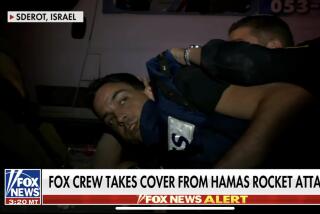An End Run Around China Live-TV Ban
- Share via
NEW YORK — Still hampered by a ban on live broadcasts from China, the three major broadcast networks and CNN continued Monday to ferry out footage of the protests in Beijing that news crews taped despite severe martial law restrictions.
Couriers and staffers were able to bring the footage out for relay from network satellite facilities in Tokyo and Hong Kong. The most prominent tape-toter since the prohibition on live transmissions took effect Friday night (U.S. time) was CBS anchor Dan Rather, who left Beijing Saturday. Piper Parry, a Hong Kong-based CNN publicist who was in Beijing when the protests erupted, also brought tapes out over the weekend.
Despite some instances of authorities trying to confiscate network tapes at the Beijing airport, network officials were keeping their fingers crossed that they would be able to get more footage out.
NBC, ABC and CNN, meanwhile, were trying to send more correspondents in, despite government restrictions on reporting--such as a ban on taping at Tien An Men Square, which several news crews disregarded Sunday without incident.
NBC News, a spokeswoman said, was seeking visas for three additions to its Beijing staff--correspondents Arthur Kent and Rick Davis, and Keith Morrison, an anchor at NBC-owned KNBC Channel 4 in Burbank.
ABC said it was dispatching Mark Litke from Manila on Monday night and Moscow correspondent Jim Laurie on Thursday. CNN, which already has a 60-member staff in Beijing, sent Brian Jenkins from his Tokyo post.
In addition to its staff buildup, NBC also worked out an arrangement with Britain’s BBC and Canada’s CBC network to share Beijing footage taped by those organizations’ correspondents and news crews, a spokeswoman said.
Getting the tapes out of Beijing remained a big concern for all the networks.
Over the weekend, “there were a couple of attempts at confiscations” of CBS news tapes by government authorities, said Don DeCesare, CBS vice president for news coverage. “But so far, we’re getting it. We have a lot more trouble with that sort of thing in other places.”
But the situation in Beijing could change at any time, he added. “We’re just trying to be relaxed and do what we have to do.”
Network reporters in Beijing still were able to report live by phone Monday, despite fears over the weekend by some there, among them CNN anchor Bernard Shaw, that authorities might cut off phone service.
The portable satellite transmitters that CBS and CNN brought to Beijing remained off, by government order. But not CNN’s Charles Hoff, who until Friday had been in charge of the operation of that network’s transmitter. A former correspondent, he was back on reporting duty over the weekend, with his taped report on events in Beijing played in the United States early Monday.
Network executives continued to hope that China might lift its ban on live video transmissions, since there is a delay of five to seven hours in getting taped footage to Tokyo or Hong Kong. ABC has ordered satellite time from an international satellite authority just in case, said Robert Murphy, vice president for news coverage.
“We check every time we can, and we’ve ordered the (satellite) birds every day,” he said, but the authorities “have given no indication when they might start taking them again.”
More to Read
The biggest entertainment stories
Get our big stories about Hollywood, film, television, music, arts, culture and more right in your inbox as soon as they publish.
You may occasionally receive promotional content from the Los Angeles Times.










